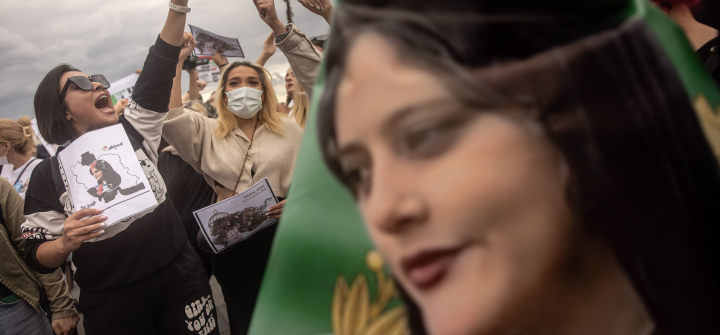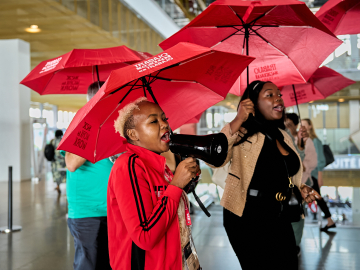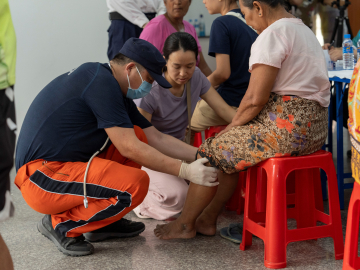Woman. Life. Freedom: The Heartbeat for Human Rights in Iran
What does it mean to be a woman?
Under the regressive and demoralizing rule of the Islamic Republic, women are considered second-class citizens, worth “half in value” in life, in court, in the workplace, and in death. The regime has made society a minefield for women, minorities, LGBTQ+ communities, and journalists who wish to unveil the regime’s atrocities to the world. Despite their oppression, women in Iran have a 97% literacy rate and 60% of post-secondary graduates are women.
Student demonstrations have become the latest targets of violent crackdowns as authorities attempt to shackle influential institutions and the powerful students within them. The prestigious Sharif University of Technology in Tehran was recently raided as students and faculty were violently attacked, detained, and murdered. Instead of spreading widespread fear, these injustices have sparked eruptions of solidarity protests across campuses in Iran, mobilized and supported by students, academics, and Nobel laureates around the world.
The inhumane death of 22-year-old Mahsa (Zhina) Amini sparked protests worldwide in what is now the largest women’s rights movement in the world. Women in Iran are at the forefront of uprisings demanding their rights—to bodily autonomy, to the freedom to choose—to all human rights.
Amini was captured and murdered for wearing a hijab loosely by the morality police in Iran—an institution established by the Islamic Republic to police women’s lives and liberties. For 43 years, women in Iran have lived under a dictatorship that fears their power and weaponizes their suppression. The women and students are at the center of these revolutions. They have always been at this fight for liberation, but we are only fully hearing their voices now.
If we just listen, we will very quickly realize that we’re at a historic juncture in determining whether women will gain or lose their voice. This is a women’s rights issue. A women’s health issue. A human rights issue. This is a cry for political reform and for basic human rights. We’re in a fight for everyone around the world who has been subject to the systems of oppression and gender-based violence—systems that benefit from our silence.
The global diaspora has gathered in peaceful protests thanks to the organization of leaders like Hamed Esmaeilion, a man who lost his daughter and wife in Ukrainian flight PS752 that was shot down by the Islamic Revolutionary Guard Corps in an act of terrorism in January 2020. Hamed has assisted in coordinating the freedom rallies sparked by Mahsa’s death in over 150 cities around the world, with over 80,000 people gathering most recently in Berlin. The engagement of the international community is essential now, more than ever, as the regime continues its attempts to silence protesters through internet blackouts, mass arrests, and incessant murder—including the IRGC’s massacre of protesters, most of them children and young adults, in what has been described as a war-zone in the Kurdish city of Sanandaj.
Some of my happiest memories as a little girl were in Iran—picnics on the mountain, stories with my family by the sea, towering cones of soft serve ice cream in Mellat Park with my grandmother. For the first time, in 43 years, there is a chance to make Iran home again. For Mahsa Amini, for Nika Shakarami, and for Hadis Najafi; for Hamed Esmaeilion, Shervin Hajipour, and the fathers, brothers and young men who are taking to the streets every single day; for anyone that has ever questioned whether their voice, or their very existence, mattered: This is your time to be brave.
What does it mean to be a woman? It means courage. It means standing resiliently even when your hands tremble. It means resistance, and growing stronger on the backs of our mothers and sisters who continue to shape history.
I stand in solidarity with the women of Iran. Do you?
Zan. Zendege. Azadi (Woman. Life. Freedom.)
Nika Elmi, MSPH, is a consultant with the International Rescue Committee for maternal mental health in conflict-settings, and a WHO researcher on barriers to postnatal care for migrant women.
Join the 50,000+ subscribers in over 170 countries who rely on Global Health NOW summaries and exclusive articles for the latest public health news. Sign up for our free weekday newsletter, and please share the link with friends and colleagues.
People protesting the death of Iranian Mahsa Amini and the government of Iran on October 2, 2022, in Istanbul, Turkey. Image: Chris McGrath/Getty





